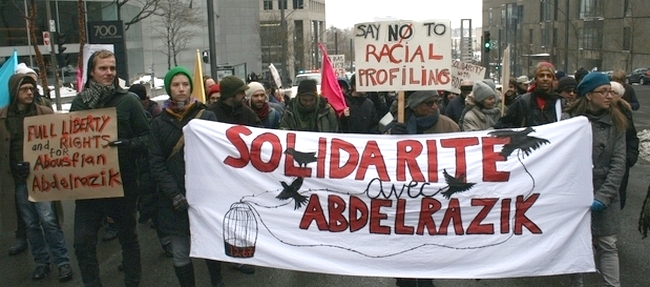
|
March 16, 2011 - No. 40 Anarchy and Violence in the Name of "War on Terror"• Need for
a Full
and Immediate Public Inquiry into G20 Police Violence -
Philip Fernandez SUPPLEMENT Demand a Full and Immediate Public Inquiry
|
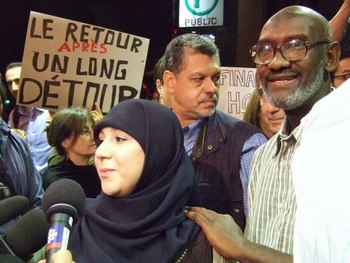 Abousfian Abdelrazik is welcomed back to Canada by family and supporters on June 27, 2009. |
For a year and a half, since Abdelrazik's triumphant return home to Montreal in June 2009, Project Fly Home and its allies have focused on the Canadian government's power and responsibility to stop applying sanctions on Abdelrazik and to withdraw from the Security Council's blacklist regime. We have organized rallies and marches, met with all three opposition parties, organized lobbying campaigns, held public information events, pulled together a coast-to-coast speaking tour, responded to government misinformation, coordinated the Just Work campaign with unions, held a direct action sanctions-busting telethon and more. Abdelrazik has also launched a constitutional challenge to the legislation imposing the 1267 blacklist regime on Canadians.
We are now entering a new phase in our solidarity campaign.
On 25 January 2011, Abdelrazik submitted an individual delisting application to the "1267 Committee" (essentially, the United Nations Security Council) through the new ombudsperson. This set in motion a review process that could take between six and ten months. That is, Abdelrazik will get a response from the Security Council on his bid for freedom any time between 25 July 2011 and 25 November 2011 -- less than five to nine months from now.
What is the ombudsperson? Faced with mounting criticism of its blacklisting regime, the Security Council embarked on a whitewashing exercise, creating, in December 2009, an ombudsperson mechanism to receive delisting requests from individuals. The first appointment, former Canadian Judge Kimberly Prost, was announced on 7 June 2010 -- the very same day that Abdelrazik filed his constitutional challenge to the blacklist in Canadian courts.
The ombudsperson mechanism does not represent any real change to the 1267 regime's delisting process. In fact, the ombudsperson is no more than a research assistant, tasked with gathering and checking information and writing a report. (Read the mandate for yourself -- PDF.)
Her mandate provides her with no significant power over the outcome of a delisting application, not even the power to make recommendations. In the end, the decision to approve or reject a de-listing application remains entirely at the discretion of the fifteen states who are members of the Security Council, any one of whom can veto a de-listing application without being held to any standard and without any obligation to give any reason whatsoever for doing so. More seriously still, the basis of the list is as problematic as ever: the elastic concept of "association" with the favourite bogey-men of the "war on terror." In other words, the delisting process remains a slave to the political considerations of states who have a track record of treating human lives as expendable.
This means that it is important, even crucial, to the success of Abdelrazik's delisting application to use the following five to nine months to good purpose: mounting as much pressure as possible to support Abdelrazik's application and publicly exposing the injustice and danger of the regime.
We are calling on allies everywhere to join in our solidarity effort, by whatever means they are best placed to use.
To begin with, two very small steps:
First, between March 14th and 25th, please phone or write your MP or, if your MP can't be convinced, the Foreign Affairs critics of all three opposition parties, asking them to endorse the following short statement:
The UN Security Council imposes an asset freeze and an international travel ban on individuals whose names have been placed on its "1267 List." The listing and delisting processes do not meet standards of procedural fairness or of natural justice fundamental to the rule of law. The 1267 Regime and the "Al Qaeda and Taliban Regulations" -- which implement the 1267 Regime in Canada -- violate rights to liberty, security and freedom of association.
CSIS and the RCMP cleared Abousfian Abdelrazik of any criminal activity in November 2007. On this basis, the Canadian government supported Mr. Abdelrazik's request to be removed from the 1267 List.
For these reasons, I call on the Minister of Foreign Affairs to 1) lift sanctions from Mr. Abdelrazik in Canada (as was done in the case of another Canadian citizen, Mr. Liban Hussein, in 2002); 2) contact the embassies of all United Nations Security Council members to inform them that Mr. Abdelrazik's removal from the 1267 List is a diplomatic priority for Canada; and 3) revoke the unconstitutional "Al Qaeda and Taliban Regulations," which were established by Order in Council.
* The contacts of federal MPs can be found here: www.parl.gc.ca/common/index.asp?Language=E
* Foreign Affairs Critics
- Paul Dewar, NDP: Dewar.P@parl.gc.ca (613) 996-5322
- Jean Dorion, Bloc: Dorion.J@parl.gc.ca (613) 992-8514
- Bob Rae, Liberal: Rae.B@parl.gc.ca (613) 992-5234
* To help convince them, you can email them our backgrounder on the 1267 list (www.peoplescommission.org/en/1267.php) and two recent reports by human rights organizations; the BCCLA's "The U.N. Security Council's 1267 Regime and the Rule of Law in Canada" and the ECCHR's "Blacklisted", both linked to our website at www.peoplescommission.org/en/abdelrazik/secret.php.
Please forward the response of your MP to us at projectflyhome@gmail.com.
Secondly, please join our new facebook group, Abdelrazik -- Project Fly Home, to keep in touch over the next months. We see this as a way of deliberately, publicly ASSOCIATING WITH ABDELRAZIK, a small gesture to throw off the fear, isolation and control that these blacklisting regimes are designed to create.
Project Fly Home
www.peoplescommission.org/en/abdelrazik
International
Hillary Clinton Declares International Information War
On March 2, U.S. Secretary of State Hillary Clinton defended the State Department's budget in front of the House's Committee on Foreign Affairs. She told the committee that the U.S. is losing the global information war and asked for extra funds to spread U.S. propaganda through "new media," news reports say.
Clinton said existing private channels are not good enough to handle the job, naming as rivals Al Jazeera, China Central Television (CCTV) and Russia Today (RT) -- which she watches, she added.
Clinton said the U.S. should step up its propaganda effort and get back "in the game" of doing "what we do best."
"During the Cold War we did a great job in getting America's message out. After the Berlin Wall fell we said, 'Okay, fine, enough of that, we are done,' and unfortunately we are paying a big price for it," she said. "Our private media cannot fill that gap."
"We are in an information war and we are losing that war. Al Jazeera is winning, the Chinese have opened a global multi-language television network, the Russians have opened up an English-language network. I've seen it in a few countries, and it is quite instructive," she stated.
Things have changed a lot since the days when Western media outlets, including BBC and CNN, had a monopoly on the coverage of world news, RT writes, adding that more and more viewers across the world tune into various foreign media to get a fresh take on events.
It is all in the numbers, RT said. For instance, RT's presence on YouTube is a real hit: almost 300 million views, when CNN International is struggling to reach 3 million.
"RT's constantly growing audience is an indication that the days of media monopoly are over and that people are demanding more multi-polar thinking," the broadcaster said. It gave the example of Al Jazeera's coverage of the unrest in the Middle East and North Africa, "which by most accounts outshone the U.S. media's presentation of events." The RT report continues:
"Not everyone, however, is happy with the wider variety of media options. The head of the federal agency that manages the U.S.'s government-run international broadcasting has basically called all those foreign media enemies.
"Last year Walter Isaacson, who heads the federal agency that manages the U.S.'s government-run international broadcasting, including the Voice of America, warned against the influence of foreign media.
"'We can't allow ourselves to be out-communicated by our enemies,' he said, in a now-infamous pitch to get his agency more funding. He did, however, later backtrack on his statement, saying that he was misunderstood.
"Journalist and filmmaker Danny Schechter says the U.S. can no longer maintain a monopoly on information."
"The United States feels defensive in part because it can no longer monopolize not only the terms of authority in these countries, but also the terms of the debate," Schechter said. "There is other information out there. There are other points of view and those points of view are profoundly damaging to a country that believes that its point of view is the only point of view."
(Russia Today)
Documents Seized From Egypt's State Security Agency
News agencies report that materials seized from Egypt's dismantled State Security agency seem to document that the Mubarak regime itself planned and executed the terrorist bombing of the Mövenpick Hotel in Sharm el-Sheikh in 2005. Readers will recall how that bombing was used by the governments of the United States, Canada and other countries and their news media to raise to an hysterical pitch their calls to tighten security in the context of their "war on terror" targeting "Islamic extremism."
On the weekend of March 5, "Egyptian citizens flocked to the burning building of State Security in the Cairo suburb Nasr City. Suspecting that vital evidence was being eliminated, they entered the burning building at great risk, securing as many secret documents as possible," the news agencies report.
Similar operations had already been carried out in Alexandria, Demanhur and other Egyptian cities, where Interior Ministry officials were busy destroying evidence of past human rights violations, corruption affairs and other illegal actions, the news agencies write. These documents are now published through Amn Dawla Leaks, named after the State Security building in Nasr City, they add.
According to first analyses, "some of the disclosed documents must be falsifications; others could be; while many seem true originals." The most outrageous documents which relate to the 2005 terror attack have yet to be verified.
The document entitled "Order 231," if not false, seems to prove that the Egyptian Ministry of the Interior was involved in the bomb attacks on the Mövenpick Hotel in the Red Sea tourist resort Sharm el-Sheikh, where over 80 persons were killed.
The document, signed by State Security agents and addressed to the Interior Minister, says: "We met yesterday [with four named persons] and agreed to all terms of the plan. ... We have agreed to target three car bombs ... the first to explode at the entrance of Mövenpick Hotel; the second near to the resort; and the third in Mövenpick village -- all owned by Hussein Salem. ... We have agreed that the operation is to start during the first hour of 23 July 2005."
Another unverified document published through Amn Dawla Leaks outlines a business conflict between Gamal Mubarak, the influential son of ex-President Hosni Mubarak, and Mr. Salem, the owner of the Mövenpick resort.
It is understood that this conflict led to the choice of the Mövenpick Hotel for the alleged terrorist attack, which later was attributed to an al Qaeda group that had never been heard of before. The attack, while temporarily ruining the Egyptian tourism industry, served the government's aim of intensifying its attack on the Islamist movement.
Analysts are discussing whether the leaked documents could be originals or falsifications. The facts about the attack mentioned in the documents are correct, which of course could indicate anything, news agencies writes. "Some say secrete services would never put any such operation in the writing. Other say, these many documents, seemingly on original paper, could not be falsified containing correct facts so short after State Security buildings were raided."
Seized documents include material on how the 2010
elections results were falsified; reports on illegal money transfers by
top regime officials; documents about how state property changed hands
by means of corruption; and details about torture and intimidation.
It is now reported that Major General Mansour el-Essawy, the new interior minister, announced the official dissolution of the security apparatus in a statement on March 15. He said a new agency in charge of keeping national security and combatting terrorism will be formed in the coming days "in line with the constitution and principles of human rights."
Related News
In related news, in February Egypt's general prosecutor opened a probe on former Interior Minister Habib el-Adly's reported role in the New Year's Eve bombing of al-Qiddissin Church in Alexandria in which 24 people were killed, an Egyptian lawyer told Al Arabiya.
Lawyer Ramzi Mamdouh said he had presented a proclamation to Egyptian prosecutor Abd al-Majid Mahmud to investigate news media reports suggesting that the former interior ministry had masterminded the deadly church attack with the intent to blame it on Islamists, escalate a government crackdown on them and gain increased western support for the regime.
Mahmud said the information contained in some reports was "serious."
The proclamation, numbered 1450, pointed to news reports citing a UK diplomat who explained the reasons why Britain has insisted on the immediate departure of Egyptian President Hosni Mubarak and his regime, especially his interior ministry's security apparatus previously directed by el-Adly.
According to the UK diplomatic sources quoted in the reports, the former interior minister had built up in over six years a special security system that was managed by 22 officers and that employed a number of former radical Islamists, drug dealers and some security firms to carry out acts of sabotage around the country in case the regime was under threat of collapse.
The proclamation, citing UK intelligence services, also pointed out that interior ministry officer Maj. Fathi Abdelwahid on December 11, 2010, began preparing Ahmed Mohamed Khaled, who had spent 11 years in Egyptian prisons, to contact an extremist group named Jundullah and coordinate with it the attack on the Alexandria church.
Khaled reportedly told the group he could assist with providing weapons he had allegedly obtained from Gaza and that the act was meant to "discipline the Copts."
After contact was made, a Jundullah leader named Mohammed Abdelhadi agreed to cooperate in the plot and recruited a man named Abdelrahman Ahmed Ali to drive a car wired with explosives, park it in front of the church and then leave it to be detonated by remote control, according to the report.
But Maj. Abdelwahid from the interior ministry reportedly detonated the car before the Jundullah recruit got out, therefore killing him and 24 worshippers in the church.
After the attack, the interior ministry officer asked Khaled to go meet the Jundullah leader in an Alexandria apartment and evaluate the success of the attack.
A few days later the two men met in an apartment in Alexandria's Abdel-Moneim Riad street. During their meeting Maj. Abdelwahid and his security forces raided the apartment and arrested them. They were then driven immediately in an ambulance to an interior ministry building in Cairo.
They stayed in detention until January 28 when the ministry of interior and its security system broke down allowing them to escape along with thousands of prisoners around the country.
When they fled, both the men went straight to the UK
embassy in Cairo and told the story of how they were set up by the
government to carry out terrorist attacks, according to the reports.
(Der Spiegel, Afrol, ABC News, Al Arabiya)
Documentary Reveals More U.S. Subversive Plans Against Cuba
 New subversive plans
organized by the government of the
United States against Cuba were unveiled during the episode "Truths and
Principles" of the documentary series "Cuba's Reasons," aired March 7
by Cuban television.
New subversive plans
organized by the government of the
United States against Cuba were unveiled during the episode "Truths and
Principles" of the documentary series "Cuba's Reasons," aired March 7
by Cuban television.
The material, which denounces the incessant U.S. efforts to destabilize Cuban society since the 1980s to the present, on this occasion focused their attempts on setting up networks for the reception and transmission of encoded information in the Caribbean nation, including plans to introduce new technology related to radio, television, the Internet and satellite antennas.
The director of the North America Department at the Cuban Foreign Ministry, Josefina Vidal, commented that after the U.S. government's dirty war policy against Cuba began to be questioned, they have been implementing some changes so that their counterrevolutionary actions may seem legal.
She added that several U.S. administrations have earmarked large sums of money for this purpose, including the government of Barack Obama.
In this respect, Vidal noted that the U.S. President approved a $40-million budget to continue the implementation of subversion projects created by his predecessor, George W. Bush.
During the audiovisual, Dalexi Gonzalez, a Cuban telecommunication engineer and agent "Raúl" for the Cuban State Security, offered details of his work with informatics security specialists financed by the Central Intelligence Agency (CIA) to establish illegal digital networks to exchange encoded data.
Their main purpose, he added, was to destabilize the Cuban socialist project, to cover up espionage activities, and to distort Cuba's reality.
The documentary showed footage and documents that prove the agents' illicit activities and the introduction of technical materials to manufacture equipment, in open violation of any country's sovereign right related to telecommunications.
See the supplement to this issue of TML Daily.
(Prensa Latina)
U.S. Citizen Sentenced to 15 Years Imprisonment
for Crimes Against Cuba
A Cuban court on March 12 issued a sentence of 15 years
imprisonment for U.S. citizen Alan Gross after he was found guilty of
acts against the independence or territorial integrity of the Cuban
state. Gross' sentence was pending after his conviction on the charges
on March 5.
According to a Cuban television report, the court made its decision
taking into account the large amount of testimonial, expert and
documentary evidence presented during the trial. This evidence
demonstrated the direct participation of the U.S. contractor in a
subversive U.S. project aimed at destroying the Revolution through the
creation of clandestine communication networks outside of the control
of
the Cuban authorities for purposes of feeding counterrevolutionary
provocations. The transmissions were to be targeted at young people,
universities, cultural and religious centres, women and ethnic groups.
Cuban news reports state that during the trial, the defendant admitted the objective of the subversive project was to promote plans of destabilization amongst diverse social sectors. He claimed he was used and manipulated by the U.S. Agency for International Development (USAID), attached to the Department of State, which finances the government contractor Development Alternative Inc. (DAI), in whose name Gross travelled to Cuba.
Gross also stated that he was used and deceived by DAI and accused DAI of putting him in peril and of landing him in the current situation, ruining his life and his family's income.
The court trial received the statements of ten witnesses, nine experts who presented 26 reports, in addition to abundant material and documentary evidence submitted by the prosecutor's office.
According to an official communiqué on Gross' conviction issued March 5, the Cuban government pointed out that the U.S. Department of State is responsible for supporting political destabilization programs against governments that are targeted by the White House in Latin America and in many other parts of the world.
Gross's wife, U.S. attorneys and consular representatives of the U.S. Interest Section in Havana were present at the trial. He may appeal his sentence to the People's Supreme Court department of crimes against state security.
(Prensa Latina)
Trial of U.S. Terrorist Posada Carriles
The trial of avowed U.S. terrorist Luis Posada Carriles has been taking place in El Paso, Texas since January. Despite being a self-admitted terrorist in the service of the U.S., Posada faces only charges on immigration fraud relating to his entry into the United States in 2005.
At the proceedings in February, Judge Kathleen Cardone permitted the testimony of two experts from Cuba. Lt. Col. Roberto Hernandez Caballero, a Cuban Interior Ministry investigator, began his testimony on February 9. Cuban medical examiner Ilena Vizcano Dime also took the stand. Both were part of the team that investigated the 1997 bombings of Havana hotels organized by Posada Carriles, in which the Canadian tourist of Italian origin Fabio di Celmo was killed. Amongst the charges of fraud facing Posada Carriles is the fact that he denied all links with these events when interviewed by an U.S. immigration judge in 2005.
 Posada lied to immigration
authorities on how he entered
the United States, prosecution witness Gilberto Abascal testified.
Judge Cardone allowed Abascal to describe to the jury details of the
trip made on the Santrina, the boat that brought Posada
Carriles illegally from Isla Mujeres, Mexico, to Miami,
Florida.
Posada lied to immigration
authorities on how he entered
the United States, prosecution witness Gilberto Abascal testified.
Judge Cardone allowed Abascal to describe to the jury details of the
trip made on the Santrina, the boat that brought Posada
Carriles illegally from Isla Mujeres, Mexico, to Miami,
Florida.
According to attorney José Pertierra, representing the Republic of Venezuela at the trial, this is crucial evidence that the terrorist falsified statements to immigration authorities on how he entered the country. The defendant told immigration officers that he came over the border by bus with the help of smugglers. Abascal's statements confirm the U.S. government's thesis about Posada's arrival to the country in the Santrina, which is owned by Santiago Alvarez, Posada's friend and financier.
Prosecutors filed charges against Posada for lying about how he entered U.S. territory and his participation in the 1997 terrorist attacks on Havana hotels.
During the hearing, prosecutors showed several photos of Posada and his accomplices in Isla Mujeres and Panama to Abascal who identified the terrorist, along with Santiago Alvarez, Osvaldo Mitat, Ruben Lopez Castro and Pepin (José Hilario) Pujol as travel companions from Mexico.
The participation of the Cuban experts in the trial is part of efforts by the Cuban government to provide assistance to the U.S. prosecution, which include four files of evidence, including the material used in the bombs, videos with declarations of witnesses and detainees, and phone calls between the Cuban authorities and the participants in the attacks. This cooperation comes despite the fact that the purview of the trial is thus far limited to the immigration charges, while the peoples of the Americas, especially Cuba, want Posada to be held to account for the numerous terrorist acts he planned, assisted in or carried out directly over several decades in various countries.
Besides circumscribing Posada's trial to only immigration charges, as the trial moves forward, further actions by U.S. authorities to protect their agent and condone terrorism against Cuba and other countries have come to light.
Pertierra informed that on January 21, it came to light that U.S. Attorney Caroline Heck Miller refused to press criminal charges against Posada Carriles despite a request to do so from the Department of Homeland Security (DHS), according to testimony from DHS attorney Gina Garrett-Jackson. Responding to defense questions, Garrett-Jackson, the DHS prosecutor who directed Posada's asylum case in 2005 said that she asked Heck Miller to charge Posada criminally, rather than simply rely on a deportation case. "I asked Heck Miller to consider criminal charges against Posada. However, she was not interested in that, and because of that, I stopped asking her for it."
Pertierra also notes that Heck Miller is not just anybody, but the very prosecutor "who insisted on bringing the case of the Cuban Five to trial, refused to move the case out of Miami and was instrumental in seeing that they would be given unjustly long sentences."
"Incredible but true, as we learned today, she is also the prosecutor in Miami who decided not to press criminal charges against Luis Posada Carriles in 2005: the man who directed the terrorist campaign against Cuba that the Five tried to stop in order to save lives. These are some of the hidden truths that this legal proceeding against Posada Carriles is uncovering here in El Paso," said Pertierra.
The Cuban government also granted the Associated Press interviews with some of Posada's terrorist collaborators, Otto Rene Rodriguez and Ernesto Cruz Leon, who were convicted and are imprisoned in Cuba.
On February 8, Rodriguez told AP that he received powerful C-4 explosives and $2,000 in cash directly from Posada to carry out the August 3, 1997, bombing at Havana's Melia Cohiba hotel, which killed the tourist di Celmo and injured many others. He was captured trying to enter the country on a subsequent trip with 1.5 kilos of C-4 that Posada had given him, he said.
"Truthfully, looking me in the eyes he cannot say he doesn't know me," Rodriguez said. "He does know me. He used me like a tool."
Rodriguez said he came to know Posada in San Salvador in 1997, but the latter was using the alias Ignacio Medina at the time. Prosecutors have alleged at the trial that Posada used various aliases, among them Medina.
Rodriguez said Posada presented himself as a "freedom fighter," and expressed interest in his services after learning he had military training and was ideologically allied with El Salvador's right-wing government which was then engaged in a civil war, part of the U.S. dirty wars in Latin America. "An American prosecutor came here and talked to me, and I promised that if I needed to testify against [the man I knew as] Ignacio Medina, I would," he said.
Cruz Leon, who has admitted setting the bomb that killed di Celmo, said he never met Posada personally, but has no doubt he was the force behind everything. He said he was paid and given explosives by another Salvadoran, Francisco Chavez Abarca. Chavez Abarca, who was arrested in Venezuela last year and extradited to Cuba, has acknowledged his role in the bombings and testified at his recent trial in Cuba that he was working for Posada.
(Granma, Associated Press, Prensa Latina)
Website: www.cpcml.ca Email: editor@cpcml.ca
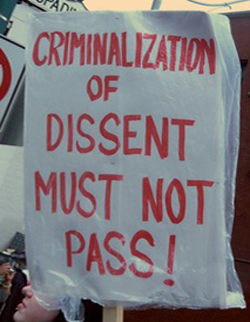 The final report of the
National Union of Public and General Employees (NUPGE) and Canadian
Civil Liberties Association (CCLA), inquiring into the police violence
at the G20 protests in Toronto, was released on February 28, 2011.
Entitled
The final report of the
National Union of Public and General Employees (NUPGE) and Canadian
Civil Liberties Association (CCLA), inquiring into the police violence
at the G20 protests in Toronto, was released on February 28, 2011.
Entitled 

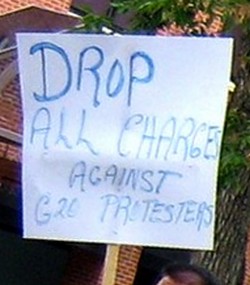

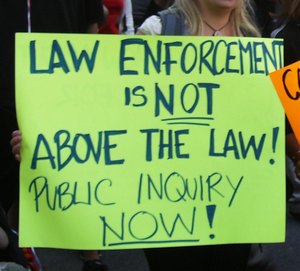

 Breach of the Peace notes
that despite the widespread
violence and abuse of rights that took place, there has been little
action so
far on the part of those
responsible for these massive acts of police violence against the
Canadian people to come forward and be held accountable. The report
accuses
the Toronto Police Services of
a campaign of disinformation aimed at trying to justify what cannot be
justified and to blame the civilian victims of the police violence as
the ones who "assaulted police" and
so on, and notes that this only serves to make the public skeptical and
cynical about the police, let alone that justice is being served.
Breach of the Peace notes
that despite the widespread
violence and abuse of rights that took place, there has been little
action so
far on the part of those
responsible for these massive acts of police violence against the
Canadian people to come forward and be held accountable. The report
accuses
the Toronto Police Services of
a campaign of disinformation aimed at trying to justify what cannot be
justified and to blame the civilian victims of the police violence as
the ones who "assaulted police" and
so on, and notes that this only serves to make the public skeptical and
cynical about the police, let alone that justice is being served.
